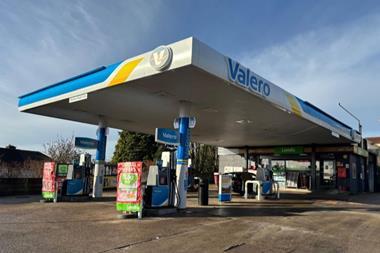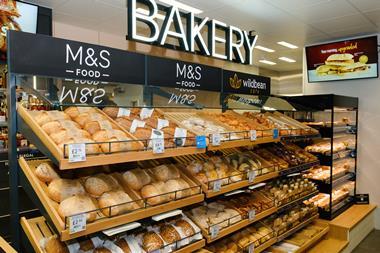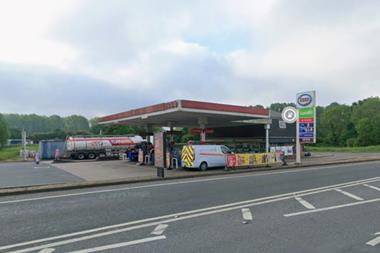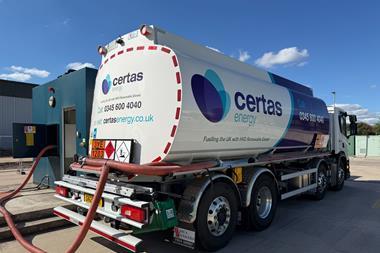Moving from catering to petrol retailing doesn’t sound a logical step, but almost two years ago the Malek family hit the ground running with their first forecourt venture and have turned a busy site in North Devon into an impressive forecourt with 2,200sq ft shop and extensive car washing facilities. The dynamic trio behind Roundswell Filling Station in Barnstaple is Herbert Malek, his son Rob – managing director – and son-in-law Paul Gyurgyak, site director. Their catering business was set up 21 years ago with one Wimpy restaurant, and peaked at six sites in North Devon. They’d had their eye on Roundswell for seven years, after buying the Wimpy restaurant on the same plot.
“It made sense to all our minds that one owner should be in charge of the whole site,” says Herbert. “It was our aim for many years and we worked hard to achieve that. We actually shook hands on it seven years ago so we knew we’d buy it eventually – we just couldn’t raise the money at that time.”
Two years ago they realised their goal, but while business was good on the fuel side, the shop was under-performing. Tobacco, for example, was being sold out of a vending machine so the first thing on the agenda was to get a cigarette gantry in fast – which saw sales jump five-fold to £4,000 per week.
Taking over such a busy forecourt has been a massive challenge, but one that the trio have taken in their stride. And being BP’s second busiest site in the West Country with an annual volume of 10.1 million litres, there was little room for error. “We knew nothing about petrol retailing – it was a daunting task for all of us and a big learning curve,” says Paul. Initially both Paul and Rob undertook on-site training with the previous owner – Rob on the back office administration and accounting side, and Paul the day-to-day operation. “I’m a firm believer in training so I jumped on the back of every course BP operated for its company-owned site managers and area managers,” says Paul.
“I even did a one-week-long residential course but I learnt a hell of a lot. The training with the previous owners was good, but you need to see the big picture. We needed to see what others were doing as well. We all agreed that the shop was under-exploited – we knew that was going to be the hook.”
The shop was only 625sq ft before the £1m redevelopment, which began in April last year. And during the development Roundswell continued to trade from a Portacabin. The new shop opened in July. “When we moved to the Portacabin sales only dropped by 5-10%,” says Rob. “That is virtually static so it proves there was a regular business there. The first month of trading saw shop sales increase by 40%.”
The trio’s decision to sign up to Spar evidently came easily. “When we saw the margins we knew we had to develop the shop,” says Rob. “We kept our eyes open to see what was happening in the industry, looked around at other garages, but Spar is a major international brand and being on the Atlantic Highway into Cornwall, we knew we needed a professional symbol.”
The shop sells everything you’d expect from a full-scale convenience store, with an off licence, hot food, and a large chilled section, which includes an innovative oval free-standing chiller unit just inside the front doors. The company is also making the most of the impulse nature of forecourt shoppers, and after reading an article in this magazine, Paul got the idea of selling mini motorbikes. “In one week we sold three at £550 each,” he says. “One guy bought two completely on impulse. We could have sold more if we’d had more, and the margins are great at 18%. Our supplier is now sending his stock over to us because we’re attracting customers that wouldn’t go to a motorbike shop.”
Development work hasn’t stopped at the shop. “The car wash was due to be replaced and we were getting big queues of about eight or nine cars and didn’t know how much business we were losing when people saw the queue,” says Paul. “So we came up with the idea of moving the bay along and having two car washes. It was a massive capital investment and our car wash business built a little bit to start with but since November, it’s started to reach its potential.” Roundswell’s valet business has grown by 50% to an average of £10-14,000 a month. But with the jet wash proving more popular with motorists, the Maleks are now considering putting in another jet wash.
While business is booming, the company is still facing and overcoming challenges all the time. “Moving to Ultimate was a challenge because we had to give tank space to two new grades,” explains Paul. “It’s difficult to maximise the usage of the tanks – you don’t want stock sitting in the ground doing nothing, but you can’t run too low.”
One of the biggest problems the Maleks have encountered is with their IT solution. “When we’d been here five or six months, we had to make the decision as to what IT system we would have,” says Rob. “We spent a lot of time in research, but we backed the wrong horse. We have to waste so many man hours putting in new stock and we lack the vital tools to fine-tune our shop.”
The company is now being forced to change the system, which will mean a further investment of £25-30,000. “We’ve had our fingers majorly burnt but what we can’t do is nothing,” says Rob. “It’s like we’re operating the business with one arm tied behind our backs. The c-store is incredibly complex and to maximise its potential, you need the right information. We need to know what sells, and what doesn’t. The problem with a back-office system is that it has the potential to bring the whole site down. Coming from catering, we can’t believe how vulnerable we are here.”
Unfortunately, despite being new to petrol retailing, their fuel supplier has been of little help. “BP didn’t volunteer any information,” says Herbert. “If you ask a question staff will tell you the answer but otherwise seem quite happy to let us sink on our own. We weren’t used to this. Wimpy, in the same situation, would send someone to help out. As a total newcomer we expected someone from BP to spend the first two days with us. It would be nice if oil companies had a system in place to send someone down when there’s a change of ownership.”
When it comes to staff, the Maleks have created a culture where staff play an important role in generating ideas. “Our staff are at the sharp end so it would be crazy not to tap into their brains and hours of experience,” says Paul. “Putting in Pay Point came from a staff recommendation as we were getting a lot of customer requests for it. Staff also devised a system to help keep on top of the re-stocking of news and magazines – sales of that category are now up by 60%.”
While Herbert, Rob and Paul acknowledge there is an industry-wide recruitment problem, they believe they have been lucky with their employees, but that having a hands-on approach and the right attitude to retaining staff has helped them along the way. “The key is empowerment, so each member of staff has their own part of the shop to look after,” says Paul. “They run decisions by me but essentially it’s the staff who run the site on a daily basis.”
But the company is evidently used to this style of management. In 1993 it became the first fast food company to achieve Investors in People accreditation, and is now working to achieve the same status for the forecourt side.
After almost one year of trading with the redeveloped shop, the company is consolidating. “We’re still fine-tuning the business,” says Herbert. “It’s been an incredible two years and we will get better at what we are doing. We always have thoughts of the future – there’s still untapped potential. Whether we open up another forecourt remains to be seen – never say never.”



























No comments yet